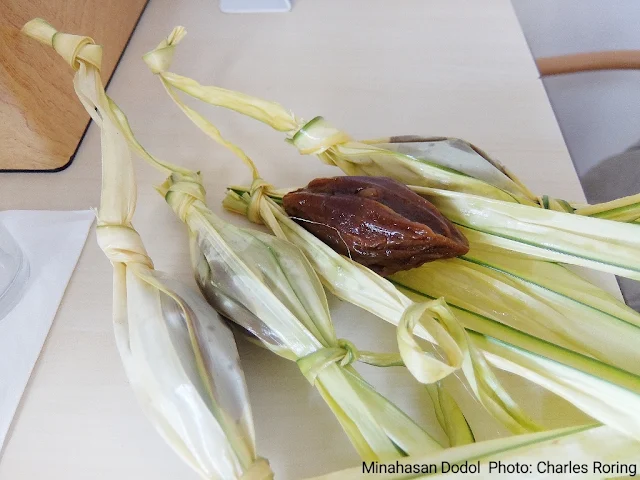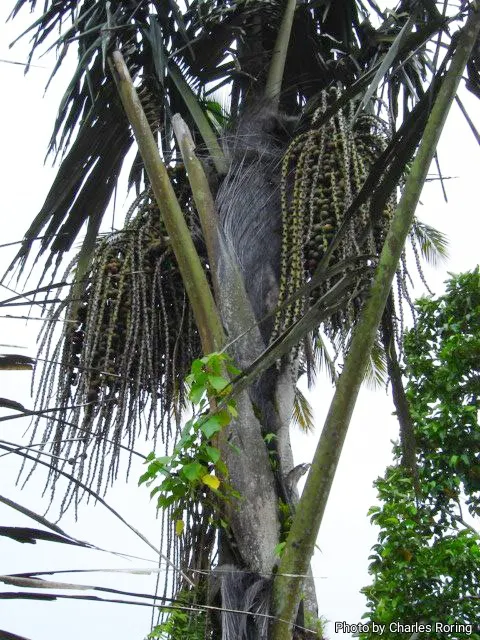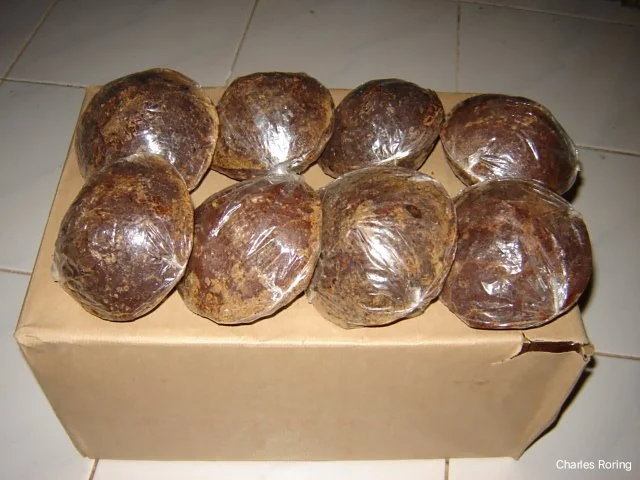Aren tree in Minahasa highland is an important plant for the livelihood of local people. Its black fiber is used to make broom and water filter. Its sap is sweet and can be drunk by peope both in its pure form or in its fermented one.
In order to make palm sugar, farmers wash the bamboo that is used as container for the sap. Water will wash away the yeast that is formed on the inside surface of the container. This will prevent the fermentation of the sap. Later the aren sap will be collected from several trees and be boiled or cooked in a large cooking pan until it becomes thick and turns into palm sugar. The thick liquid of the palm sugar will later be poured into coconut shell. When it has cooled, it will become a solid hard palm sugar that looks like caramel.
 |
| Dodol is rice cake that is made of glutinous rice flour, coconut milk, and palm sugar |
Palm sugar is an ingredients in various kinds of traditional cakes such as Dodol, Halua Kenari, and Cucur. It is added by some local people as sweetener in coffee or tea. There is a factory in Leilem village where coconut sap is processed to make palm sugar.
The bones of the leaves are used to make stick broom.
The sweet sap is the raw material for making palm sugar and its fermented form can be refined to make alcoholic drinks called Cap Tikus or Sopi.
 |
| Aren Tree in Minahasa Highland |
 |
| Traditional Palm Sugar made of the Sap of Aren Tree in Minahasa regency |
Aren tree (arenga pinnata) is the highest in terms of bio-ethanol production compared to other plants such as sugarcane, wheat, rice, cassava, and banana.
It is also called Saguer tree in Minahasa, the Province of North Sulawesi, Indonesia. It is a kind of palm which is similar to Sawit and Coconut trees. While I was travelling around Sonder village, I could take a picture of Aren tree between two coconut trees. Aren or Saguer has more leaves. Its color is also darker than coconut. There are approximately two million Aren trees in Minahasa. If all of them are productive, their sap can produce 876,000 kilo litres of bio-ethanol. Traditionally, the sap from Aren has been used in the production of alcoholic drinks by the villagers in Minahasa; Borneo; Java, Papua New Guinea, Malaysia, Fiji, and other islands in the Pacific. The sapping method is significantly different among tribes.
The sap is tapped from male inflourescence spadix twice a day, usually in the morning and in the afternoon before dark. The highest tapping is obtained during the full-moon period. Villagers don't tap the sap from female spadix due to its inferior quality.
One Aren tree can produce between 1 and 20 liters of sap/day. Ten percent of it, after fermentation and distillation, will be converted into bio-ethanol. According to Indonesian Science Agency - LIPI, one hectare of land can accommodate from 75 to 100 trees. On the average, one hectare of Aren trees produces 1,000 liters of sap a day which is equivalent to 100 liters of bio-ethanol. It means that the amount of bio-ethanol produced from one hectace of land is 36,000 liters/ year. This figure is higher than sugarcane.
A number of companies have constructed bio-ethanol distillaries in Indonesia. One of them is located in Motoling, South Minahasa, Indonesia. Its production capacity is 1.5 metric ton of 99.5% bio-ethanol/day. Indonesia is seriously developing its bio-fuel and renewable energy resources after becoming net-importer of oil. This year alone, Indonesia has quit from its membership in OPEC. The soaring oil price in the world market creates more burden to national budget due to the fuel subsidy. This unfavorable situation forced the government to reduce the subsidy by raising the fuel price. Such policy creates massive street protests nationwide, food price hikes and instability in the country.
It is hoped that the production of bio-ethanol from Aren or Saguer trees, sugarcane, cassava will help poor farmers in getting higher income thus improving their economy.
If you are interested in visiting Manado city, Minahasa highland and other regencies in North Sulawesi and want me (Charles Roring) to organize your trip and guide you, please, contact me by email to: peace4wp@gmail.com or by whatsapp to: +6281332245180.

No comments:
Post a Comment